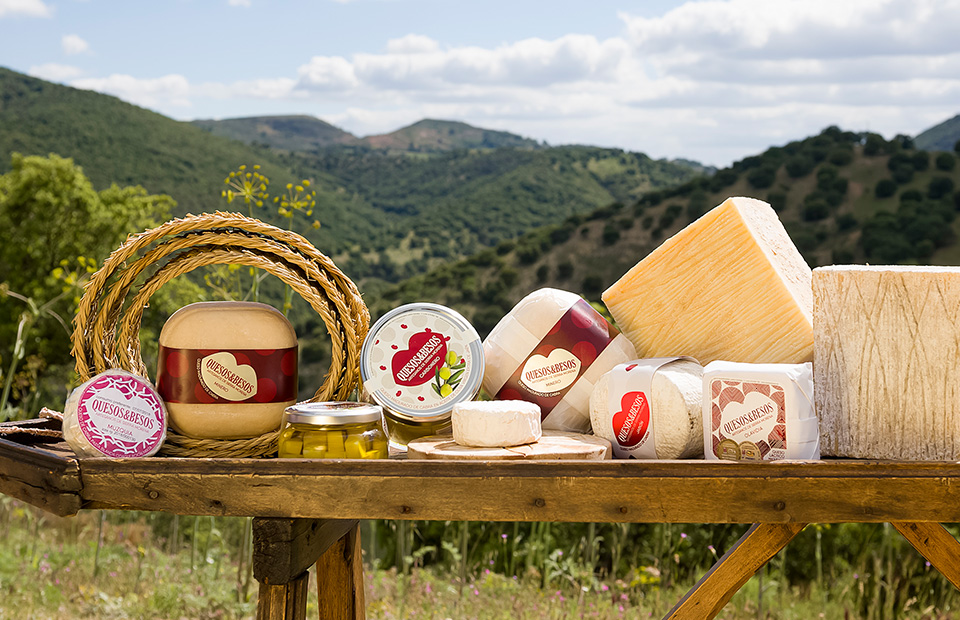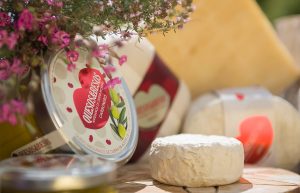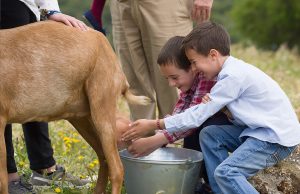Case study 06-ES
Silvia Peláez
Introduction
Quesos y Besos began its activity in 2017 and since the beginning it has won several national and international awards. The livestock tradition comes from Francisco’s family; they have always had animals and made cheese for their own consume.
Silvia Peláez and her husband Francisco Romero carried out this idea of a company that with great effort and daily dedication is rewarded by the good acceptance that their cheeses have. They use attractive designs, a balanced quality-price ratio and bet on small packages. They take advantage of all the market opportunities in terms of promotion, with direct sales in their cheese factory, in specialized gourmet shops and chains, in gastronomic fairs and also online. They organise guide tours of the dairy during which the visitors are allowed to watch the ongoing production process. In addition, they organize various gastronomic events and promote training, with food pairing courses and workshops for children, young people and adults to make their own cheese.

Farm/Enterprise description
Silvia and Francisco, after working outside the province for a few years, decided to return to their hometown and start this project and inculcate their children with the values and knowledge of the rural world, returning to their origins.
The families of both have been working with goat’s milk for several generations, both in the sale of milk and in the production of cheese. Francisco’s parents are the owners of the cattle farm, although they will soon give the replacement to their children. They extract about 60,000 litres of milk per year, depending on the season. From February to June is when most of the milk is produced, corresponding to the goats’ births.
In 2017 they set up the cheese factory in Guarromán, because it is logistically very well located. It was built so that it could be visited. Through the windows in the corridors, the facilities and the entire production process can be seen.
They receive guided visits off adults and children´s groups and even hold a workshop to make their own cheese and thus bringing the visitors closer to the rural world.
They take part in events and gastronomic fairs, they have carried out several courses in their facilities with French experts, cheese makers from all over Spain, such as the “course on the refining of enzymatic cheeses and defects”
“If you believe in a project that is also part of the rural environment, they should be encouraged to carry it out, because the consumer increasingly values local, natural and artisan products”.
“You have to have a lot of patience and constancy, invest all your time at least initially, fight, be present everywhere, travel, move, visit other companies and keep the good and discard the negative”.


Multifunctional farming activities related to dairy processing / Innovation related to products and/or processing
Since they started, guided tours of the facilities are organized where you can see the whole process, because it was the initial idea of their project.
They are developing and enhancing more and more the online channel at the level of social networks. The consumer who chooses to shop online, if you are able to make him loyal, will continue buying because it is a very comfortable method and because he knows that the product comes directly from where it is made.
They use a delivery service that transports refrigerated products, which ensures that the cold chain is not interrupted and they are 2 minutes away from the dairy. They take the cheese from them at night and the next day it arrives at its destinations all over Spain.
They use 3 technologies to make their cheese: enzymatic (using animal rennet with young goat’s milk or vegetable rennet with thistle flower), lactic (no rennet, it curdles by the action of lactic bacteria) and mixed (combination of both).
The most innovative products are lactic coagulation cheeses, which are widespread in France but little known in Spain and even less so in Andalusia.
The formats of all their cheeses are not the typical round ones, they are square and with very original and attractive designs.
Another novelty is the development of mould on the rind, typical of natural caves.
As a last novelty they are developing packs in their online store, where apart from the products requested they give you a virtual tasting of 2 hours, where they show you the facilities and make a food paring tasting.
General considerations
They consider that bureaucracy is laborious but they adapt to the administration’s deadlines and do not find it very complicated. Silvia was responsible for quality in her previous job so all these procedures are managed by her without any problem. She is still in contact with the teachers of the course she took at IFAPA in case she has any doubts, but the administrative procedures are followed by her.
They had problems with the financing because they could not find entities that would bet on them since they did not want to guarantee anyone in their family. They were about to leave the project but finally the Caja Rural (a savings bank) offered to finance it.
They applied for FEADER funds at the regional agricultural ministry. That process was, complex but they received specific consultancy. They are in contact with local action groups such as the “ADR Campiña Norte”, who advise them.
They always use quality milk, from their own farm, and do not buy milk from third parties, as is the case of other producers. They do not have intermediaries. They control the whole process from the moment the milk is extracted until it is processed into cheese ready to be sold in their facilities or through the website.
The cheeses mature in a natural way and there can be a 40% loss of product because they do not use any additional treatment, as many other companies do. This generates a higher cost of the products but is not valued as it should be.
All the innovative activities they carry out, such as lactic coagulation, mould formation in the rind, etc, provide added value. When customers stop by the dairy to buy cheese, they can visit the facilities and experience the whole cheesemaking process thus they are not just buying cheese but an experience.
They belong to the “QUERED” association (Spanish Network of Country and Artisan Cheese Maker’s) and to Quesandaluz (Association of Andalusian Cheese Maker’s), which keeps them informed of what is happening in the sector, such as changes in regulations, training courses, sale of second-hand machinery, etc.


Training/Competences (Skills, Knowledge, Attitudes) especially relevant for the process
Currently, there is no requirement for specific training for dairy processing, but Silvia considers it to be essential. You have to be trained in cheese making, of course, but also in business management. In this sector there are many farmers who have no previous training. A few years ago, many farmers, especially in Andalusia, set up cheese factories out of necessity and because the milk was cheaper, but as they had no training their business did not last long. She thinks that the more training, the better, about cheese making, about the type of cheese they want to make, about marketing, etc. If the entrepreneurs are fluent in the language and want to go abroad for training, even better. In France, there is a lot of training of this kind.
Silvia took the official IFAPA course “Specialist in Cheesemaking”. She considers it to be complete, consisting of 13 modules to be carried out in 14 weeks, with topics such as cheese making, quality control, prevention of occupational hazards, machinery, diversification and innovation, marketing, economics of the cheese company, etc. However, Silvia believes that it is not enough because you have to have more than one vision, knowing several approaches to the same issues in order to be able to choose the one fitting your context the best. She thinks that training abroad gives you another perspective.
She also took the “Cheese Making Course” at the IRTA Technological Institute in Barcelona.
In La Seu d’Urgell, Lérida, the “Course of Ripening of Cheeses and Elaboration of Soft cheese” and a course on lactic fermentation in Valladolid, among others.
Photo gallery












